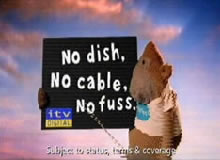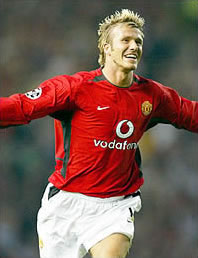plc - The business of football
Unbalanced Books
Reduced TV Revenue
 Football clubs have now become to rely on TV revenue as their main source of income, and expected successive deals to be larger and bring greater wealth. This was the case in 2001 when the last round of TV deals were made, but were no doubt the last time football was to attract such large amounts of money - £1.6 billion being paid by BSkyB and ITV for Premier League matches and highlights respectively. The Football League had also managed to secure a lucrative contract of £315 million pounds from ITV Digital - the digital terrestrial platform backed by media giants Granada and Carlton. These deals were done at a time of the 'dot com bubble', where media companies believed large payments for such events would come good in the end.
Football clubs have now become to rely on TV revenue as their main source of income, and expected successive deals to be larger and bring greater wealth. This was the case in 2001 when the last round of TV deals were made, but were no doubt the last time football was to attract such large amounts of money - £1.6 billion being paid by BSkyB and ITV for Premier League matches and highlights respectively. The Football League had also managed to secure a lucrative contract of £315 million pounds from ITV Digital - the digital terrestrial platform backed by media giants Granada and Carlton. These deals were done at a time of the 'dot com bubble', where media companies believed large payments for such events would come good in the end.
Of course in terms of the Premier League, that is probably true, but the match up of both the lowly subscribed ITV Digital and less attractive Football League was a flawed proposition from the start. ITV Digital was in a similar position to that of Sky in the early 90's. Where as Sky gambled its fortunes on the Premier League - whose teams attract supporters from across the country, ITV Digital secured rights to all three Football League divisions, whose supporters are more locally based and more likely to go the grounds than watch the games on the telly. ITV Digital was also flawed as a platform, weak signals and a coverage that didn't cover the country meant that those who did decide to watch their local team probably couldn't receive it's ITV Sport Channel anyway. The situation wasn't helped by not being able to secure carriage of the channel on Sky - whose platform attracted around 6 million subscribers.
 It was with this in mind, that Carlton and Granada, making a loss of £1 million a day from ITV Digital, tried to renegotiate its contract with the Football League to who it still owed £178.5 million over two years. Unsuccessful in its attempts, it pulled the plug on ITV Digital, leaving 72 football clubs without important TV revenue, and perhaps 30 in serious financial trouble - some of who were already in administration.
It was with this in mind, that Carlton and Granada, making a loss of £1 million a day from ITV Digital, tried to renegotiate its contract with the Football League to who it still owed £178.5 million over two years. Unsuccessful in its attempts, it pulled the plug on ITV Digital, leaving 72 football clubs without important TV revenue, and perhaps 30 in serious financial trouble - some of who were already in administration.
Increasing Players Wages
Many fans saw the ITV digital crisis and immediately blamed the TV companies. But the crisis only really brought forward problems regarding TV deals that would have emerged next year, and these problems are likely to affect even the Premiership.
 The problem lies with players inflating wages, and chairman's increasing willingness to spend big on players transfer fees and more importantly wages, regardless to whether the funds actually exist to pay them. The top players such as Michael Owen and David Beckham can expect to attract between £70-100,000 a week. Lesser players also expect similar rates of pay, whether they're actually worth it or not. When the Premier League has become the only league that matters, chairman have no option but to gamble their clubs futures on securing membership, and paying the wages to attract the otherwise unattainable players.
The problem lies with players inflating wages, and chairman's increasing willingness to spend big on players transfer fees and more importantly wages, regardless to whether the funds actually exist to pay them. The top players such as Michael Owen and David Beckham can expect to attract between £70-100,000 a week. Lesser players also expect similar rates of pay, whether they're actually worth it or not. When the Premier League has become the only league that matters, chairman have no option but to gamble their clubs futures on securing membership, and paying the wages to attract the otherwise unattainable players.
QPR was at one time in the Premiership, but is now in administration languishing in the lower league positions, having lost £27 million in four years. As a Premiership team it had 61 professional players, some who would never make the reserve team, let alone the first. It's youth team players were on equally ridiculous salaries - employing two players who would hardly make the youth team yet still earned nearly £100,000 a year.
If you give a club £50m they'll spend it. If you give a club £100m they'll still spend it. And what does it get spent on - transfers and salaries.
Alan Sugar, Former Chairman Tottenham Hotspur FC
This has been possible in the past because TV companies were expected to pay more and more money for rights with each successive deal. But next time round, Sky - the only real contender for rights available to the clubs now, is likely to only put forward a considerably reduced offer to what would have been expected, yet players are unlikely to agree to reduced salaries.
Players wages have led to fans believing the players are no longer motivated because they get paid whatever the outcome of the games and is leading to a detriment of game in general. Suggestions of reintroducing maximum wages per player or divisional wage caps are means of clubs needing to save themselves from themselves.
FC/plc: Football Vs Business
A small text I created to aid research and for use in my Final Major Project in Year 3 of my degree programme. Written May 2002.
FC - Football Becomes Big Business
plc - The Business of Football
Conclusion
Shop with Amazon.co.uk
- The Football Business
- David Conn
